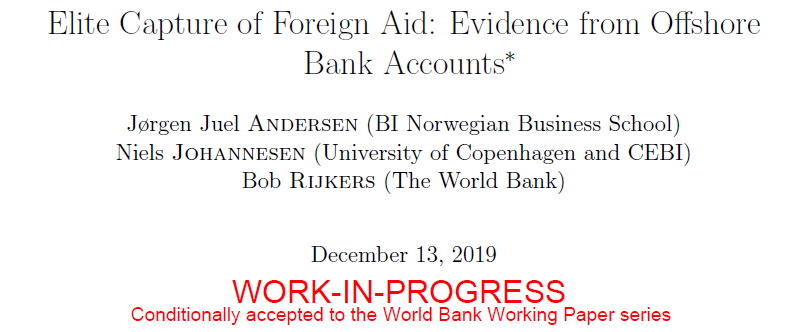The double-edged nature of exposing corruption is manifesting at the global level as a World Bank report on corruption among elite of neediest countries is attracting its own controversy.
Information coming out of the World Bank shows that its aid to countries considered neediest have not gone to filling the needs of the people but to offshore bank accounts, mostly in tax havens such as Switzerland, Luxembourg, Cayman Islands and Singapore.
This is based on a report which looked at 22 of the most aid-dependent countries – mostly in Africa –and which compared data on aid disbursements from the World Bank with foreign deposits from the Bank for International Settlements (BIS).
But the report became the subject of a global uproar last week following allegation by The Economist that the World Bank was trying to suppress it showed data correlating aid payment with money flows to offshore bank accounts, suggesting funds are siphoned off from the nations they are meant to help.
According to the version of the news on the report published MercoPress, South Atlantic News Agency, February 20th, 2020, aid payments are mirrored by rising deposits in the safe heavens as against the flow pattern in non-haven countries, thereby suggesting a correlation to monitors,
 MercoPress quotes the authors of the report as saying, “We document that aid disbursements to the most aid-dependent countries coincide with significant increases in deposits held in offshore financial centers known for bank secrecy and private wealth management”.
MercoPress quotes the authors of the report as saying, “We document that aid disbursements to the most aid-dependent countries coincide with significant increases in deposits held in offshore financial centers known for bank secrecy and private wealth management”.
One of the conclusions of the report is that World Bank estimates suggest a leakage rate of “around 7.5% for the average highly aid-dependent country”.
The paradox about this report is the controversy which it has generated. No one is sure now which is the issue of a greater value for anti-corruption warriors across the world. Is the conclusion that elite of neediest countries steal help lines from the World Bank or the allegation that the bank was trying to suppress the report and which The Economist suggests as the reason Penny Goldberg, the bank’s chief economist is taking an early departure and returning to academia. Both the action of the elite and attempt at suppression, if established, are acts of corruption, with equal ethical and political consequences. Many would say that it is unlikely The Economist would make the allegation if there is nothing like that because its reputation will be at risk.
Instructively, the World Bank found the allegation worth replying, saying delay in publishing the report had nothing to do with suppressing the content but with the review process. It argues being a supporter of independent research stretching to studies of corruption.
MercoPress quotes the bank as saying in a statement that the draft paper titled, ‘Elite Capture of Foreign Aid’ underwent several reviews and improvement as a result of that. But the query remains, that being how the World Bank’s statement did not specify what changes were made due to the review. In particular, critics are harping on how the conclusion in an earlier draft of the study that aid payments “cause” increased deposits in offshore accounts was changed in the final version where ‘caused’ was replaced with “coincide with”. Could the change be justified by the difficulty of proving causation?
The original authors of the study are Jorgen Juel Andersen of BI Norwegian Business School, Niels Johannesen of the University of Copenhagen, and Bob Rijkers of The World Bank.




























